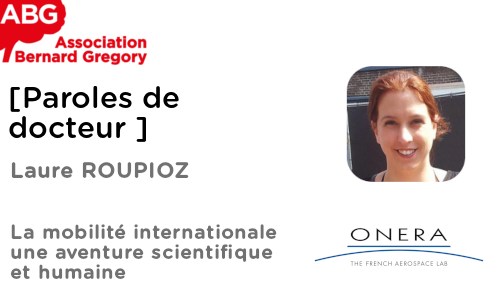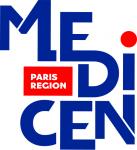Laure ROUPIOZ: International mobility, a scientific and human adventure
Before her position at ONERA, Laure Roupioz has come a long way…

Author : Laure Roupioz, PhD
The path to achieving a PhD can be very different from one candidate to another. Mine has led me to meet many people with a wide variety of backgrounds. It has allowed me to gain knowledge and expertise in my field but also to meet people from very different cultures, that is very important, and to work in different contexts and with approaches that were not my own. I would therefore like to share this experience with you through this testimony.
IT ALL STARTS IN FRANCE
For some, the choice of a training program or a profession is obvious. For others, it is not. In my senior year, I was one of those who still did not know what path to follow. Being interested in everything related to nature and the environment, I decided to go to an engineering school in the field of agronomy. Once we had taken the preparatory classes and the first year of the engineering cycle, we had the choice: go on an ERASMUS exchange for 1 semester or do a double degree program. The principle of this program was to complete the entire year in a university abroad, validating both the engineering training in France and the foreign master's degree. That time, I knew exactly where I wanted to go. Not for a particular field of study, but for the desire to see what is going on elsewhere. That way, I could experiment with other ways of teaching and mix with other cultures. The subject of the master's degree was not the main motivation for this choice and, even if it meant discovering new horizons, I chose a program that was radically different from what I had studied until then, the master's degree in Geo-Information Sciences and Remote Sensing.
THEN THE NETHERLANDS
It was the first time that my school had offered this double degree program, which, unlike the ERASMUS exchanges that are carried out all over Europe, had to take place at the University of Wageningen in the Netherlands. In other words, the destination was not my dream. At the time, I would have preferred an English-speaking or more exotic country. But this one allowed me to go abroad for one or even two years instead of six months, with an international diploma at the end... My hesitation about the destination quickly disappeared. The small town of Wageningen has more than 12,000 students from over 100 different countries. There was no doubt about the exotic and multicultural side of the city. In addition, most Dutch people speak very good English, so not being in an English-speaking country was no longer a problem either. I was finally going to be able to learn how to express myself properly in English, something which, despite more than 10 years of learning, was still very difficult for me. In fact, I remember taking an exam upon my arrival to evaluate my level of English, for which I received a catastrophic grade. When the person in charge of the master’s program told me that I would have to take courses to bring me up to standard, I kindly replied that until now the theoretical teaching of English had not been too successful and that I preferred to follow my friends around bars rather than take courses, that it was the best way for me to learn. He laughed and let me do it and in one month I was speaking English, not perfectly, but correctly! At least enough to take my classes and have fun.
In the context of the small town of Wageningen, where everyone comes from all over the world, it is rather easy to integrate. Everyone is a "foreigner", far from family and friends, coming to discover new horizons, and this encourages exchanges and encounters. Even the Dutch students who come here to study are, for the most part, quite happy to mix with students of other nationalities and some of them told me that they no longer feel like "locals". I quickly felt at home in this cosmopolitan universe with only one cultural norm but many different perspectives and points of view to understand and discover. This fully responded to my desire to see how things are elsewhere. However, it is my very personal perception of this experience that I consider unique and enriching. Among the people I have been with, not everyone experienced it in the same way, for some it was even difficult. We also all had different motivations for coming, for some it was the wish to take a particular course, for others an obligation in their curriculum, so the expectations were not the same neither. It is also important to remember that for students coming from countries with a lifestyle very different from Western life, adaptation can sometimes be complicated. But for most of them it is an opportunity to experience incredible adventures that are sometimes worth sharing. I remember the first snowball fight of a Tanzanian friend or the bicycle lessons given to students who have never ridden a bicycle in their lives. Contrary to in France, the Dutch are used to speaking during lessons and exchanging with their teachers. I was surprised by the rather direct interactions that took place during the classes. In the teacher/student relationship, the hierarchical difference is less pronounced than the one we sometimes find in France, or at least the one I felt during my studies. The lack of English language skills may have something to do with it, but not only. Although it may be surprising at first, it quickly becomes very appreciable.
A particularly interesting point in the master's program in the Netherlands is the emphasis on interdisciplinary projects. As students of the master's program "Geographical Information System and Remote Sensing", we had a project to carry out in complete autonomy with students of a master's program in architecture and spatial planning. This project lasted several months and aimed at setting up an application to guide tourists in a historical area of the Second World War. The experience was excellent because in addition to our radically different approaches to the subject, we had to deal with the culture of each person: French people working in their own corner, a German woman who likes to direct everything, very fussy Dutch people, a Chinese person who did not dare to say no...
What I will retain from this program between France and the Netherlands is the different and complementary training I received. French training that gave me working methods and a solid scientific basis and Dutch training that gave me self-confidence and allowed me to develop my "soft skills" such as teamwork and project management in different contexts.
AND A LITTLE FURTHER
After graduation, I worked at the Alterra Research Institute of Wageningen University as a junior researcher. I preferred to get to know the world of research before I started my thesis. This work was a very enriching experience allowing me to collaborate with researchers from all over the world through different projects. In one of them, the opportunity to write a thesis arose. In addition to being a very interesting subject, the thesis would be co-directed between France, the Netherlands and China. It took me 5 minutes to accept this wonderful opportunity. As for going to explore new horizons, I was spoilt!
Those who have had several thesis supervisors will tell you, it is not easy every day. And if you add to that a cultural mix, the result can be explosive. Even though there were some tensions and we had to learn to understand each other to work together, I could not have dreamed of better supervision. We are all slightly shaped by our personal and professional backgrounds, we grew up in cultures that leave their mark, and it is sometimes difficult to step outside of that framework to see things differently. Even if the exercise is difficult, it allows us to progress and even to get off the beaten track by trying to adopt another perspective. And isn't this what is expected from PhD candidates? The scientific approach can only benefit from it.
This experience is also positive from a human point of view. Having so far remained essentially in a European context, going to China was a new step in cultural discovery and allowed me to observe another way of approaching the PhD. The relationship with my Chinese supervisor was sometimes complicated but we always managed to talk freely. She behaved differently when she interacted with her Chinese PhD candidates, she was tougher, and they never said a word when they were in her office. The reporting relationship was not the same. She had to maintain her credibility with the students and her team, whereas with me it was not necessary. She was used to working with Europeans, so she knew how to adjust, without taking too much offence when I discussed some of these ideas. I still had to be a little less direct than with the Dutch... We all adapt unconsciously to the person we are dealing with but doing it with people who do not have the same social codes can sometimes be difficult.
Having left for one or two years, I ended up staying almost 7 years in the Netherlands, with many trips in between. I returned to France for personal reasons and now work as a remote sensing research engineer at ONERA. I am less likely to interact with foreign students or colleagues, but my experience still serves me well today. In addition to a strong international network, I have learned other ways of working and adapting to different contexts. In the framework of European projects, communication with other partners is easier. I have also learned that it is essential in working or managerial relationships to try to put oneself in the place of the other person in order to understand their reactions. Most conflicts arise from a lack of understanding, a lack of communication because we do not all have the same experience or the same codes, even when we come from the same country.
It is said that traveling trains youth, but this applies to any multicultural exchange you may have, even within your school or university in France. When it comes to going abroad, it is not always easy, but there is so much to learn from others to get out of your comfort zone... So, if I had just one message to convey: do not hesitate to make contacts and participate in international exchanges, if it does not directly advance your subject, it will advance you!
Get ABG’s monthly newsletters including news, job offers, grants & fellowships and a selection of relevant events…
Discover our members
 Aérocentre, Pôle d'excellence régional
Aérocentre, Pôle d'excellence régional  Nokia Bell Labs France
Nokia Bell Labs France  ADEME
ADEME  ANRT
ANRT  Tecknowmetrix
Tecknowmetrix  TotalEnergies
TotalEnergies  SUEZ
SUEZ  Servier
Servier  ONERA - The French Aerospace Lab
ONERA - The French Aerospace Lab  Généthon
Généthon  Groupe AFNOR - Association française de normalisation
Groupe AFNOR - Association française de normalisation  ASNR - Autorité de sûreté nucléaire et de radioprotection - Siège
ASNR - Autorité de sûreté nucléaire et de radioprotection - Siège  Ifremer
Ifremer  Medicen Paris Region
Medicen Paris Region  Nantes Université
Nantes Université  Laboratoire National de Métrologie et d'Essais - LNE
Laboratoire National de Métrologie et d'Essais - LNE  Institut Sup'biotech de Paris
Institut Sup'biotech de Paris
